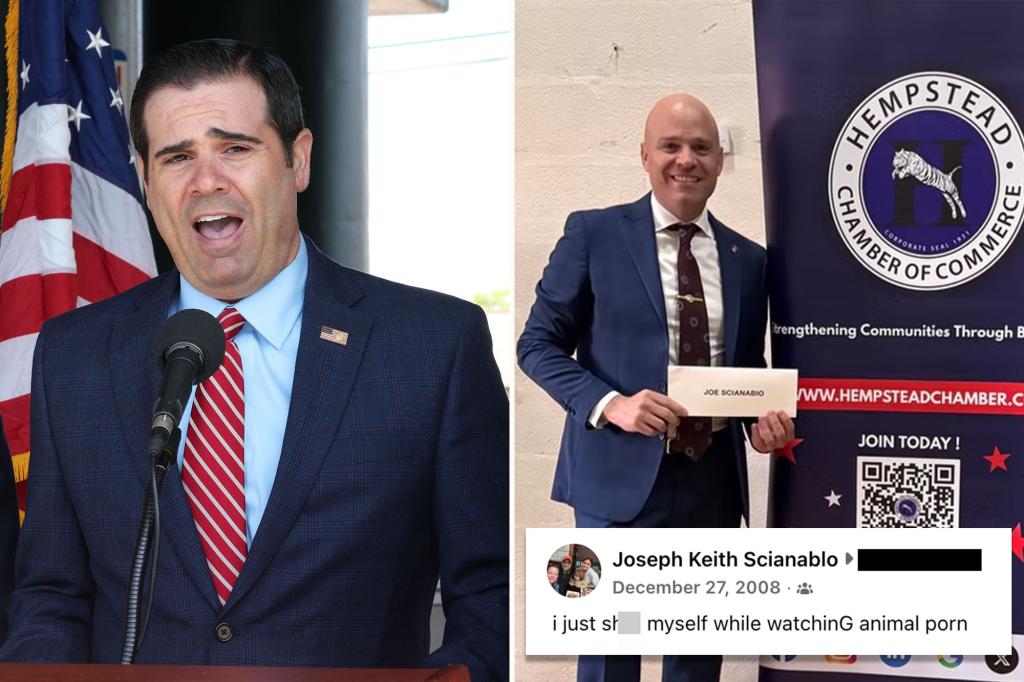A Political Drama Unfolds in Hempstead Township
In a contentious political battle brewing in America’s largest township, Democratic candidate Joseph Scianablo has filed a lawsuit against the Town of Hempstead, alleging Republican leaders orchestrated an illegal appointment of his November opponent, John Ferretti, to the supervisor position. The legal challenge, filed in Nassau Supreme Court, claims town Republicans violated New York’s open meetings law through what Scianablo describes as a “backroom deal” that unfolded when current Supervisor Don Clavin unexpectedly resigned during a board meeting on August 5th. “What happened in the Town of Hempstead is not democracy,” Scianablo told reporters after filing the suit, arguing that Republicans had planned this succession in advance without providing proper public notice—a requirement under state transparency laws. The lawsuit seeks to rescind Ferretti’s appointment, mandate transparency training for town officials, and cover Scianablo’s legal expenses.
The Democratic challenger points to several circumstances suggesting the appointment was premeditated rather than spontaneous. Scianablo noted that Ferretti’s family appeared at the meeting well-dressed for what seemed like an anticipated ceremony, and referenced a Newsday interview where Ferretti himself admitted to having “a couple of days” notice about his likely appointment. Further fueling Scianablo’s suspicions was how quickly the town implemented changes after the appointment—Ferretti’s name appeared on Town Hall within hours, and his campaign promptly updated their slogan to “Return John Ferretti,” leveraging his newly acquired incumbent status ahead of their November 4th election showdown. These rapid developments, Scianablo argues, demonstrate that Republican leadership had orchestrated this transition well in advance without transparency.
Republican officials have dismissed the lawsuit as a “publicity stunt” lacking merit, with Ferretti’s spokesperson Brian Devine suggesting it demonstrates “a total lack of knowledge regarding local government.” Town Attorney John Maccarone defended the board’s actions, stating there was “no legal necessity for a resolution” that would have required listing Clavin’s resignation or Ferretti’s appointment on the public agenda beforehand. The Republican-led administration maintains they had no advance notice of Clavin’s resignation, despite Ferretti’s own admission of having some forewarning. The conflicting narratives highlight the partisan tensions underlying this dispute, with each side presenting contradictory accounts of how events unfolded during that pivotal board meeting and whether proper protocols were followed in the transition of power.
Beyond the procedural questions, Republican officials suggest Scianablo’s legal challenge serves primarily as a distraction from his own campaign controversies—most notably, a 2008 Facebook post that has become a persistent liability. The post in question allegedly showed Scianablo writing about having “s–t” himself while watching “animal porn,” content that Republican opponents have branded as disqualifying for someone seeking to lead a township whose responsibilities include overseeing an animal shelter. The explosive nature of this old social media content has continuously plagued Scianablo’s campaign efforts, forcing him into a defensive posture. He has consistently denied authoring the post, instead claiming his “dopey” brother played a prank on his account—even producing a statement from his brother taking responsibility for the embarrassing content.
The unfolding situation in Hempstead illustrates how local politics can mirror national political dynamics, complete with accusations of power grabs, questions about transparency, and the weaponization of candidates’ past statements. As supervisor of America’s largest township, the winner will oversee significant governmental operations and budgets, making the stakes particularly high for both parties. The legal battle also highlights ongoing tensions about proper governance procedures and whether political expediency sometimes trumps public transparency requirements. While no court date has yet been set for Scianablo’s lawsuit, the litigation adds another layer of complexity to an already heated campaign season in this New York community.
As November 4th approaches, Hempstead voters face a choice between two candidates now embroiled in controversy—Ferretti defending the legitimacy of his appointment and current position, and Scianablo fighting both the alleged procedural violations and his own past scandals. The outcome of both the legal challenge and the election will significantly impact governance in this major township. Whatever the court decides regarding the appointment process, the situation underscores how procedure and transparency remain contested territory in American local government. Meanwhile, residents of Hempstead must evaluate competing claims about proper governance, personal character, and qualification for office as they prepare to select their next leader—demonstrating that even at the township level, American politics remains intensely personal, procedurally complex, and deeply divisive.












